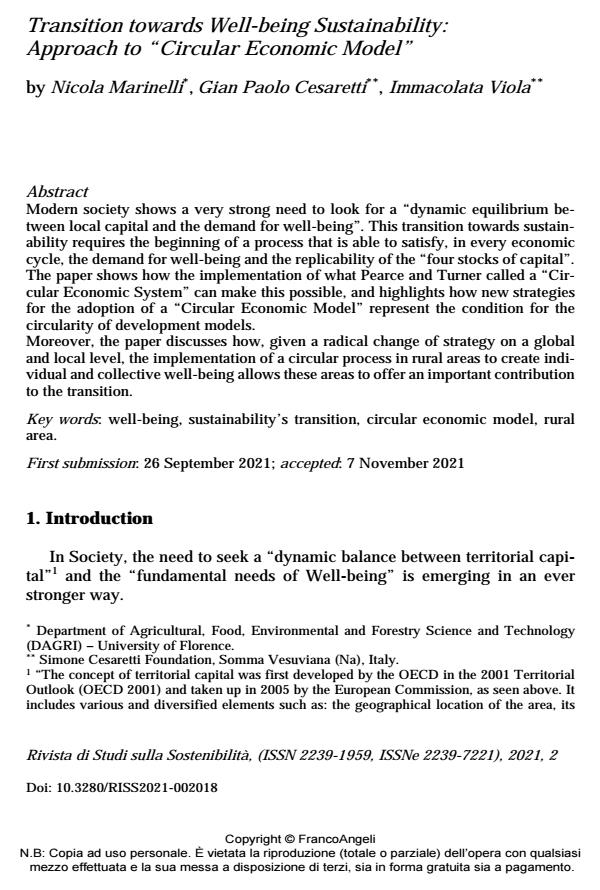Transition towards Well-being Sustainability:Approach to "Circular Economic Model"
Titolo Rivista RIVISTA DI STUDI SULLA SOSTENIBILITA'
Autori/Curatori Nicola Marinelli, Gian Paolo Cesaretti, Immacolata Viola
Anno di pubblicazione 2022 Fascicolo 2021/2 Lingua Inglese
Numero pagine 20 P. 263-282 Dimensione file 200 KB
DOI 10.3280/RISS2021-002019
Il DOI è il codice a barre della proprietà intellettuale: per saperne di più
clicca qui
Qui sotto puoi vedere in anteprima la prima pagina di questo articolo.
Se questo articolo ti interessa, lo puoi acquistare (e scaricare in formato pdf) seguendo le facili indicazioni per acquistare il download credit. Acquista Download Credits per scaricare questo Articolo in formato PDF

FrancoAngeli è membro della Publishers International Linking Association, Inc (PILA)associazione indipendente e non profit per facilitare (attraverso i servizi tecnologici implementati da CrossRef.org) l’accesso degli studiosi ai contenuti digitali nelle pubblicazioni professionali e scientifiche
Modern society shows a very strong need to look for a "dynamic equilibrium be-tween local capital and the demand for well-being". This transition towards sus-tainability requires the beginning of a process that is able to satisfy, in every eco-nomic cycle, the demand for well-being and the replicability of the "four stocks of capital". The paper shows how the implementation of what Pearce and Turner called a "Circular Economic System" can make this possible, and highlights how new strat-egies for the adoption of a "Circular Economic Model" represent the condition for the circularity of development models. Moreover, the paper discusses how, given a radical change of strategy on a global and local level, the implementation of a circular process in rural areas to create in-dividual and collective well-being allows these areas to offer an important contri-bution to the transition.
Keywords:well-being, sustainability’s transition, circular economic model, rural area.
- Becattini G. (1989). Riflessioni sul distretto industriale marshalliano come concetto socio economico. Stato e Mercato, 25.
- Bernetti I., Alampi Sottini V., Marinelli A., Sacchelli S., Scozzafava G. (2013). Evaluation of economic, social and sector impacts of agricultural land loss. Italian Journal of Agronomy, 8(4): 197-205, e24.
- Bernetti I. and Marinelli N. (2010). Evaluation of landscape impacts and land use change: A Tuscan case study for CAP reform scenarios. Aestimum, 56: 1-29.
- Blanc M. (1997). La ruralité: diversité des approches. Économie Rurale, (242): 5-12.
- Bodiguel M. (1986). Le rural en question. Paris: L’Harmattan, 183 p.
- Bonato R. and Nobile M. (2014). Il benessere, un percorso multidisciplinare. Hórisma, 1.
- Cesaretti G.P., Borrelli I.P. and Viola I. (2021). Circular economic analysis for Sustainability. Rivista di studi sulla Sostenibilità, 1: 201-221.
- Cesaretti G.P. and Viola I. (2021). La Sostenibilità del Benessere tra equità intra-generazionale e inter-generazionale. In: Poce R. (a cura di). Pillole di coscienza collettiva. Immaginare l’inedito umano. Kinetes Edizioni.
- Fabbrizzi S., Maggino F., Marinelli N., ... Ricci C. and Sacchelli S. (2017). Sustainability: A quantitative discourse analysis. Rivista di Studi sulla Sostenibilità, (1): 11-25.
- INSOR (1992). Comuni urbani, comuni rurali – per una nuova classificazione. Milano: FrancoAngeli.
- INSOR (1994). Rurale 2000. Milano: FrancoAngeli.
- Jayet H. (1996). Flux et position des espaces ruraux. Revue d’économie régionale et urbaine, (2): 383-394.
- Kahneman D., Diener E. and Schwarz N. (a cura di) (1999). Well-being: Foundations of hedonic psychology. New York: Russell Sage Foundation Press.
- Manelli A. (2012). Sostenibilità finanziaria e finanza sostenibile. Rivista di studi sulla Sostenibilità, 1: 11-13, DOI: 10.3280/RISS2012-001002
- Menghini S. and Marinelli N. (2011). Sustainability and markets in the theories of welfare and consumer behavior | Sostenibilità e mercati nelle teorie del benessere e del comportamento dei consumatori. Italian Journal of Agronomy, 6(SUPPL. 2): 55-59.
- Mersden T., Murdoch J., Lowe P., Munton R. and Flynn A. (1993). Constructing the countryside. London, UCL Press, 220 p.
- Mougenot C. et Mormont M. (1988). L’invention du rural. Bruxelles: Vie ouvrière, 288 p.
- OECD (2011). How’s Life? Measuring well-being. OECD Publishing.
- Pearce D. and Turner R.K. (1991). Economia delle risorse e dell’ambiente. Bologna: il Mulino.
- Porter M.E. (2011). Il vantaggio competitivo. Torino: Einaudi.
- Ryff C.D. (2014). Psychological well-being revisited: Advances in the science and practice of eudaimonia. Psychotherapy and psychosomatics, 83(1): 10-28.
- Ryff C.D. and Singer B. (1998). Human health: New directions for the next millennium. Psychological Inquiry, 9(1): 69-85.
- Resmini L. and Torre A. (2011). Competitività territoriale: determinanti e politiche. In Competitività territoriale. Milano: FrancoAngeli, p. 45.
- Viola I., Rotondo G. and Maccari N. (2013). Il benessere oltre il PIL. Rivista di Studi sulla Sostenibilità, (1): 9-26.
- Waterman A.S. (1993). Two conceptions of happiness: Contrasts of personal expressiveness (eudaimonia) and hedonic enjoyment. Journal of Personality and Social Psychology, 64(4): 678-691.
Nicola Marinelli, Gian Paolo Cesaretti, Immacolata Viola, Transition towards Well-being Sustainability:Approach to "Circular Economic Model" in "RIVISTA DI STUDI SULLA SOSTENIBILITA'" 2/2021, pp 263-282, DOI: 10.3280/RISS2021-002019